
Medea ennables Jason to capture the Golden Fleece
Marble sarcophagus relief fragment. Rome, post mid-2nd century CE

The mythic heroine Medea plays many roles in ancient legend and literature, from the young and innocent princess, daughter, sister and priestess, to the other woman, wife, and mother, who becomes a murderess, killing even her children in revenge for her husband Jason’s betrayal. Heroic in temperament and act, she is transformed by Jason's infidelity into a sorceress who transcends the mortal world and escapes its punishments. Few of the ancient sources, literary or visual, portray the young girl who encounters the handsome Argonaut Jason and experiences the passion of love for the first time. In the passages below the Roman poets Ovid and Valerius Flaccus envision her as an inexperienced virgo on the brink of womanhood, giving voice to her doubts and wrenching conflicts. Rather than a barbarian sorceress, they depict a Roman daughter whose pietas demands that she obey her father and exhibit pudor. Thus she desperately struggles against her unexpected feelings for Jason, a foreigner who has arrived in her homeland, Colchis on the Black Sea, sent on a quest by King Pelias to seize the Golden Fleece from its guardian serpent. The poets convincingly present a young girl suffering from the confusion and distress of first love, her symptoms metaphorically illustrated as sickness or fire. Medea cannot understand why she can neither dismiss these feelings nor why she is preoccupied with thoughts of Jason. While her words offer insight into a young woman's nature, Medea is no ordinary girl with an innocent teenage crush on a handsome stranger. The outcome of Medea's struggle with pudor and amor is more than personal, for without the powerful potion of the granddaughter of the Sun and priestess of Hecate, it is clear that the Greek hero Jason has no hope of completing his mission. Medea puts up a valiant fight in her attempt to remain dutiful to father, family and country, almost conquering her feelings and even considering suicide, but her resistance is futile since this passion, so like the furor of Dido for Aeneas, has been divinely inspired. This characteristic Ovidian dilemma between passion and reason obviously influenced Valerius Flaccus’ conception of Medea, while both Latin poets drew on Apollonius of Rhodes’ portrayal of the young Medea in his influential Hellenistic epic Argonautica, written in Greek in the early third century BCE. For further information see Corrigan's book in the Bibliography.
In the passage below Ovid imagines the words the young Medea would have used to confront and manage the emotional turmoil aroused by her first sight of Jason. Her monologue opens in hopeless despair, moves through uncertain self-questioning, and concludes with the acceptance of her feelings for the man she has transformed in the course of her self-address from ominous stranger to hero and lover. In this passage Ovid illustrates through borrowed language his awareness of the parallels between Medea's infatuation with Jason and Vergil's portrayal of Dido's love for Aeneas; different in outcome, their passion is equally tragic. The poem is written in the meter of epic, dactylic hexameter.
vincere non poterat, "frustra, Medea, repugnas:
nescioquis deus obstat” ait “mirumque nisi hoc est,
aut aliquid certe simile huic, quod amare vocatur.
nam cur iussa patris nimium mihi dura videntur?
15(sunt quoque dura nimis!) cur, quem modo denique vidi,
ne pereat timeo? quae tanti causa timoris?
excute virgineo conceptas pectore flammas,
si potes, infelix. si possem, sanior essem,
sed trahit invitam nova vis, aliudque cupido,
20mens aliud suadet; video meliora proboque,
deteriora sequor. quid in hospite regia virgo
ureris et thalamos alieni concipis orbis?
haec quoque terra potest quod ames dare. vivat an ille
occidat, in dis est; vivat tamen! idque precari
25vel sine amore licet; quid enim commisit Iason?
quem nisi crudelem non tangat Iasonis aetas
et genus et virtus? quem non, ut cetera desint,
ore movere potest? certe mea pectora movit.”
Valerius Flaccus wrote his mythological epic Argonautica, incomplete at his death, under the Flavian emperors, almost a century after Ovid's Metamorphoses was published. In the passage below he portrays Medea as a romantic young girl, sleepless in her bedroom late at night after gazing on Jason's exploits in battle; speaking to herself, she ennumerates her symptoms, questions their cause and, unlike Ovid's Medea, she seeks to free herself from her feelings by willing Jason to leave. Although the monologue below is straightforward, this Silver Age poem is composed in the obscure expressive style of the period and in the traditional meter of epic (dactylic hexameter).
“nunc ego quo casu vel quo sic pervigil usque
10ipsa volens errore trahor? non haec mihi certe
nox erat ante tuos, iuvenis fortissime, vultus.
quos ego cur iterum demens iterumque recordor
tam magno discreta mari? quid in hospite solo
mens mihi? cognati potius iam vellera Phrixi
15accipiat, quae sola petit quaeque una laborum
causa viro. nam quando domos has ille reviset?
aut meus Aesonias quando pater ibit ad urbes?
felices, mediis qui se dare fluctibus ausi
Click on the underlined words for translation aids and commentary, which will appear in a small window. Click on the icon link![]() to the right of the line for related images and information.
to the right of the line for related images and information.